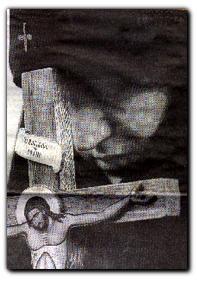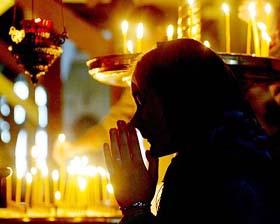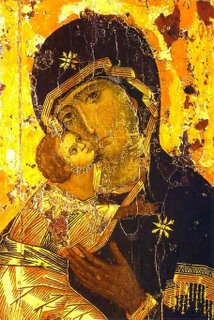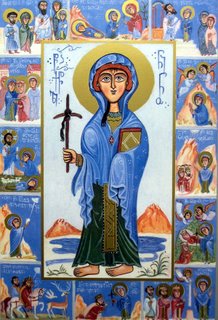I have read some interesting and note worthy thoughts by Christians on what has happened with Ted Haggard. I offer two below. The first is taken from a post from Scott McKnight's Blog
www.jesuscreed.org. He has some noteworthy thoughts regarding the evangelical Christian world and what can be learned from it. Below that, is an article taken from Frederica Matthewes-Green's website
www.frederica.com and was found, as well, on First Things website
www.firstthings.com.
Most who know me, would know that this story would be of special interest to me.
Scott McKnight on Ted Haggard"And I wonder what we can learn from yet another moral collapse of an evangelical leader.
What is perhaps saddest is that this has gone on for a long time in his life. I’m not sure making more or new accountability structures for leaders is the place to start, though I’m quite sure we will all begin to think about this more.
But, what I find here is what I want to call the evangelical environment. In evangelicalism, and the charismatic stream in which Ted Haggard swims, sin is bad and sin by leaders is real bad. This leads to a complex of features that creates a serious problem:
1. Christians, and not just pastors, do not feel free to disclose sins to anyone;
2. Christians, including pastors, sin and sin all the time;
3. Christians, including pastors, in evangelicalism do not have a mechanism of confession;
4. Christians and pastors, because of the environment of condemnation of sin and the absence of a mechanism of confession, bottle up their sins, hide their sins, and create around themselves an apparent purity and a reality of unconfessed/unadmitted sin.
5. When Christians do confess, and it is often only after getting caught, they are eaten alive by fellow evangelicals — thus leading some to deeper levels of secrecy and deceit.
What we saw with Haggard is not just about leaders; it is about all of us"
Ted Haggard and Suffering Frederica Matthewes-GreenPosted Tuesday, November 7, 2006
[First Things, November 7, 2006]
I was in Denver for about a hundred minutes this weekend. I hadn’t planned it, but when I arrived at the airport Friday morning to begin my journey to Calgary, I was surprised to see that’s where I would change planes. The story about Ted Haggard had hit the news the night before, and I had been for some reason really moved by it. I walked through the Denver airport praying the Jesus Prayer for him: “Lord Jesus Christ, have mercy on Ted.” That whatever needed to happen would happen, and that it would be used for Ted’s ultimate healing. And I prayed for his wife, Gayle, and their five children. I cannot imagine their pain.
I was probably not the only person who found his initial response suspicious: “I did not have a homosexual relationship with a man in Denver.” Imagine that you’re a guy, and a male escort you’ve never heard of suddenly announces to the press that you two have been in a sexual relationship for years. After you got through screaming “WHAT?!?” for a few hours, you would say, “This is really sick and creepy and repulsive. I have never met this guy. It is scary to think anyone could have this kind of full-blown delusional fantasy going on. This is some kind of John Mark Karr thing. I’m disgusted, and I feel stalked, and am talking to the police about protection.”
So “I did not have a homosexual relationship with a man in Denver” was pretty feeble. “In Denver”?
But in the rush of travel, I didn’t catch any images of Haggard until the return trip Saturday; I didn’t know what he looked like. An airline rescheduling unexpectedly brought me back through Denver on the way home — that had the looks of something God-arranged. This time while praying my way through the airport I spotted some newspaper dispensers with Haggard’s name in the top headlines. I knelt to read the stories and saw that sad truths were coming to the surface.
But I also saw a photo of Haggard, and for the first time connected a face with the name. So that’s the guy! I had seen this face before, I guess in photos of evangelical leaders. It sure had struck me as
a crazy-scary one – somebody I’d instinctively step away from. The zones of his face are sending out conflicting messages. It looks like both terror and attack. The overall effect is frenzied.
Ted wrote in
the letter read to his church on Sunday: “There is a part of my life that is so repulsive and dark that I have been warring against it all my life.”
In the Eastern Orthodox Church, we speak of the impulses that move us toward any kind of sin as “passions.” You shouldn’t think of this term as related to “passionate.” It’s more like “passive.” (As in “The Passion of Christ;” his passion is what he endured.)
These impulses beat us up. They originate as thoughts, sometimes as thoughts that evade full consciousness. The roots are tangled with memories, shame, anger, fear—and the thoughts are also very often inaccurate.
All this mess damages our ability to see the world clearly. We go on misreading situations and other people, and venture further into confusion. The illness compounds itself, to the delight of the Evil One who nurtures lies and has no compassion on the weak. To him, the weak are breakfast.
Eastern Christianity speaks of this as the darkening of the nous, that is, of the perceptive center of a person. (Most English bibles translate nous as “mind,” but that’s not quite it; the nous is not the rational intellect, but a perceiving faculty. Thoughts and emotions are subsequent reactions to the nous’ perceptions.) The damaged nous is like a pair of glasses fitted with distorting lenses. It needs healing.
The Greek word represented by this kind of “passion” is “pathos.” It means suffering. It is because we are helpless in our suffering that Christ came. He took on vulnerable human form, and went into the realm of Death and defeated the Evil One. Now we are invited to gradually return to health, by fully assimilating the truth that sets us free – by assimilating the presence and life of Christ himself. “It is no longer I who live, but Christ who lives in me,” St Paul said. This life fills and changes us like fire fills a piece of coal.
In the Eastern Christian understanding, sins are not “bad deeds” that must be made up in order to satisfy justice. They are instead like bad fruit, which indicates a sickness inside the tree (the analogy Jesus uses in Matthew 7:7-8). Sin is infection, not infraction. And God not only forgives freely, but sent his Son to rescue us when we were helpless.
With God’s help, we begin to heal. Like an athlete striving for the prize (I Cor 9:24, Phil 3:14, 2 Timothy 2:5) we resist succumbing to lying thoughts. The ancient spiritual disciplines – continual prayer, fasting, and love of others – are like the exercises in a time-tested workout routine. They make us stronger. When we fall, we get up. This is a life of continual repentance – and you can see in that word re-pent, “re-think.” Salvation is health, and health comes from knowing the truth and resisting lies. This gradually heals the nous so that it is restored to its original purpose: to perceive God’s light permeating all Creation.
St. Paul writes, “Be transformed by the renewal of your nous.” The biblical word for repentance, meta-noia, means literally the transformation of the nous. We are welcomed into God’s kingdom in an instant, as we see in the story of the Good Thief; but full healing comes slowly, and will continue every day that we live.
So it is a mistake to present Christianity the way some churches do, as if it is the haven of seamlessly well-adjusted, proper people. That results in a desperate artificial sheen. It results in treating worship as a consumer product, which must deliver better intellectual or emotional gratification than the competition. And that sends suffering people home again, still lonely, in their separate metal capsules.
What all humans have in common is our “pathos.” Getting honest about that binds us together. And then we begin to see how the mercy of God is pouring down on all of us all the time, just as the Good Samaritan bound the wounds of the beaten man with healing oil. May God give this healing mercy to Ted and Gayle, and to their children. May God reveal his healing mercy to Michael Jones, who told the truth. May God have mercy on all of us.






 Recently, I was impacted by an article on hospitality of Abraham and Sarah. Rublev's icon here of the Trinity, I learned, is also known as the "Hospitality of Abraham and Sarah." In the article I read, the author shared a story about a woman who kept a copy of this icon in her room. This image became a picture to her of God's hospitality towards us. There are three angels sitting at a table, representing the Trinity. The fourth place at the table is empty--the one facing us. This place is for you and me. They are making room for you and I to come in. I was deeply moved by this--God's hospitality towards us. He makes room at His table for us. That is amazing to me! Closing Quote from another article on the subject of hospitality reminds me of the call of the Christian to mimic or imitate the hospitality of God. St Maria of Paris wrote, "At the Last Judgment I will not be asked whether I satisfactorily practiced asceticism, nor how many prostrations and bows I have made before the holy table. I will be asked whether I fed the hungry, clothed the naked, visited the sick and the prisoner in jail. That is all I will be asked."
Recently, I was impacted by an article on hospitality of Abraham and Sarah. Rublev's icon here of the Trinity, I learned, is also known as the "Hospitality of Abraham and Sarah." In the article I read, the author shared a story about a woman who kept a copy of this icon in her room. This image became a picture to her of God's hospitality towards us. There are three angels sitting at a table, representing the Trinity. The fourth place at the table is empty--the one facing us. This place is for you and me. They are making room for you and I to come in. I was deeply moved by this--God's hospitality towards us. He makes room at His table for us. That is amazing to me! Closing Quote from another article on the subject of hospitality reminds me of the call of the Christian to mimic or imitate the hospitality of God. St Maria of Paris wrote, "At the Last Judgment I will not be asked whether I satisfactorily practiced asceticism, nor how many prostrations and bows I have made before the holy table. I will be asked whether I fed the hungry, clothed the naked, visited the sick and the prisoner in jail. That is all I will be asked."




